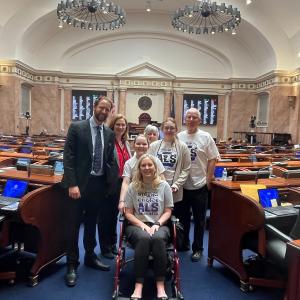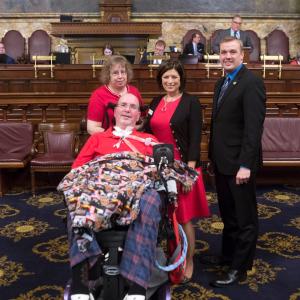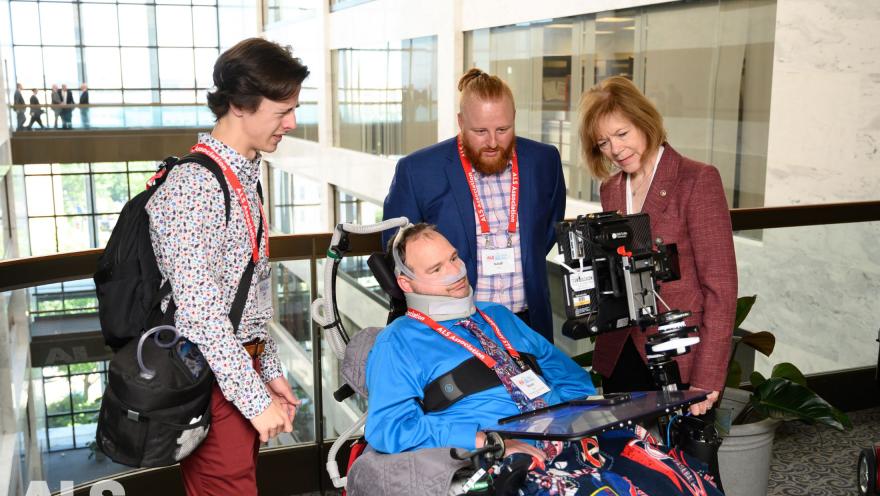According to recent ALS Focus survey data, people with ALS and their caregivers are accustomed to submitting claims and prior authorization requests to health care insurers. Unfortunately, they are also far too familiar with experiencing insurance denials.
Approximately one in three participants reported submitting at least one claim or prior authorization that has been denied. Many participants noted that jumping through the hoops of these processes, even if it eventually results in an approval, puts additional strain on individuals and families already dealing with so much.

More must be done to ensure the ALS community is receiving the timely critical care and equipment they need without the hassle. On a recent Connecting ALS podcast, we spoke with Kara Nett Hinkley, national vice president of state policy at The ALS Association and member of the National Association of Insurance Commissioners' Consumer Advisory Board, to discuss some of the important work being done to break down these barriers to accessing health care.
The following partial transcript of that conversation has been edited for brevity and clarity.
Broadly speaking, what are some of the ways insurance companies erect barriers to access to care?
An umbrella statement to put a lot of these issues under are these utilization management tools. You have health insurers and now you have pharmacy benefit managers as a third party that they put in place; these utilization management tactics that are really there to control costs.
Pharmacy benefit managers (PBM) are a booming industry and they've been going pretty unregulated for the past 15, 20 years, and it just so happens they were out of touch, out of reach for regulation or legislation to control some of their practices or to make anything they were doing transparent. It used to be that the insurers had these consultant relationships, and they were off the table for regulation. And that has really shifted since 2022.
Luckily, in our role with the National Association of Insurance Commissioners' (NAIC) Consumer Advisory Board, we've been able to be part of a very small consumer work group marking up the first of its kind PBM regulation in the ways of model policy.
The NAIC puts out recommended model policies and white papers that all state insurance commissioners who are members of NAIC will receive and they look forward to the guidance the NAIC puts out as a way to have a blueprint for how to do things right in their state so they are protecting consumers within the industry, that they're really there to serve and protect. So we, on that work group, were able to really go through and redline markup 35 pages of model policy that initially didn't mention patients a single time.
What are some of the other policies the team is looking at in various states to try and address some of the challenges to access that you see?
We have a divided Congress. And because of that and because of internal politics and what we really see politically on the horizon, these things are really going to be handled at the state level for right now. This year alone, we've taken a position on 396 pieces of state legislation across 49 states. Of those, 97 have already been enacted, and six more sit on governor's desks today. We secured state appropriations to the tune of $16 million so far, so $10 million more than last year, but who's counting? Those dollars go toward ALS clinics and ALS care services more broadly.
The majority of them are bills to make sure there are patient-friendly and consumer-friendly policies at the state level to get rid of some of these barriers, both to access as well as affordability because access without affordability isn't access, period.

Thirty of the bills we've taken a position on this year would expand coverage for biomarker testing; 27 would prohibit the use of copay or accumulator adjustment programs. These are one of those utilization management tactics that I mentioned that insurers, PBMs, are using to capture rebates and hold on and make the process more lucrative for them while putting more of a financial burden on patients. It doesn't allow for patients to use their patient assistant programs or drug coupons for manufacturers to count towards their out-of-pocket costs, so they're fully responsible for paying their out-of-pocket costs up to the maximums while the rebates and the funding that they're able to capture for PBMs goes directly back to the health insurers.
Seventeen of the bills aim to reform prior authorization regulations. Prior authorization is a utilization management tool used by health insurers and PBMs to cut costs. We know that when access to medications and equipment is delayed or denied, many patients won't submit an appeal. It’s cumbersome, it's confusing, it's intentionally opaque and unclear, and we want to make sure patients have transparent and patient-friendly reforms to the prior authorization process.
Are the prior authorization protocols of a plan, are those transparent and upfront when you're actually shopping for the plan? Are the stipulations and guidance for this plan written in plain language? Are there defined turnaround times for prior authorization? If I submit an appeal, how quickly will that be heard and responded to? And not only that, who is actually reviewing that appeal? We want to make sure there are qualified specialists reviewing appeals and offering these denials when they offer them.
Oftentimes, we're hearing more and more about batch denial software where hundreds of prior authorization requests are denied in a matter of minutes. That certainly does not indicate a patient's medical record is properly being reviewed. Making sure we get a handle across the board on prior authorization I think is really critical. And then I'll just highlight, we've also seen 15 general drug access and affordability pieces of state legislation.
We want to make sure the metrics they're using as they are looking at the cost benefit analysis for the drugs they include on their formularies, we want to make sure that those metrics aren't discriminatory.
Not all of these fights are happening in every state. Is there reason to believe that wins in one state beget wins in another state and create something of a snowball effect so that the winning becomes infectious?
Absolutely. We even talk internally as an organization; how do we make sure we're not recreating the wheel? How do we look into what others have done? How do we fail forward? How do we see where things have gone off track and learn from one another?
State legislatures function in the exact same way. We always attend the National Conference of State Legislatures, NCSL. They have a legislative summit every year, and it's the largest gathering of state legislators and legislative staff across the country. And why do members go there? They go there to connect with one another, and they go there to hear best practices across the states. Legislators certainly reach out, especially regionally, to states around them to see what they are doing, what is working, and what is not working.

In Medigap, we had successes in Kentucky, Virginia, and Nevada this year. However, we're also seeing momentum in Nebraska, Texas, Arkansas, Illinois, Rhode Island. It's certainly catching on, and that's what good policy does, and we want to be the fan to that flame. Certainly sharing best practices and good policy with members is really what we aim to do at these events.
Two bills stand out to me this year that are really important to us. They are first of their kind legislation enacted this year. The State of Washington enacted a bill to increase diversity in clinical trials. We think this is obviously a very important thing to do, and we are certainly going to be sharing that with legislators from Minnesota, Vermont, Alabama, Arizona. We want to certainly keep lifting up and echoing what are good policies to make sure the clinical trials are inclusive, that we're making sure we are really dedicating as much as we can to making sure the pipeline is diverse, is equitable, and therefore when drugs come to market, they work for everyone. That's certainly a big priority for us.
Another bill that comes to mind is one that was passed in Colorado this year. It prohibits medical bankruptcy from impacting credit scores. That's obviously something folks really do have to deal with who have high-cost health conditions like ALS and making sure medical bankruptcy cannot be counted against you in the calculation of your credit score. It's incredibly important for people and it's incredibly important for families.
CLICK HERE to listen to the full Connecting ALS podcast episode “Making Insurance Accessible for People Living with ALS.” You can subscribe to Connecting ALS at ConnectingALS.org.
To find more information about navigating health insurance benefits while living with ALS, visit our website HERE.
To learn more about how you can become an advocate and join the fight to help the ALS community, visit our website HERE.


Join the conversation. Please comment below.